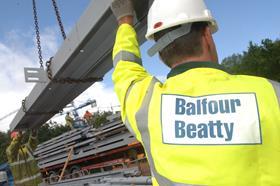Balfour Beatty’s construction business has reported a £41m half-year loss largely due to problems in the UK

Reporting its results for the six months to 28 June 2013, Balfour Beatty said its global construction services business reported an operating loss of £41m for the period, compared to a £59m operating profit for the same period last year, largely due to problems in the UK construction business.
The construction division reported revenue of £3.2bn, including share of joint ventures, down 6% on the same period last year, with revenue in the UK construction business down 16% to £1.39bn. UK construction revenue is now broadly similar to US construction revenue, which rose 5% to 1.37bn.
Speaking to analysts this morning, chief financial officer Duncan McGrath said the UK construction business reported an operating loss of around £35m over the first half of the year - the bulk of the £41m loss across the global construction division.
He said this was largely the result of a £45m write down on contracts in the UK construction business, which was highlighted in April when the firm issued a £50m profit warning.
He said the business would make a further £5m write down in the second half of the year, but expected the UK construction business to report a £32m profit over the second half, bringing it close to breaking even over the full year.
The overall construction services order book rose 9% to £8bn from the end of 2012. However the UK order book fell by 6% over the first half of the year to £2.7bn, considerably less than the US construction services order book, which rose 15% to £3.5bn.
Overall the Balfour Beatty Group reported a pre-tax loss of £6m, down from a profit of £92m for the same period last year, with the performance dragged down by the losses in the construction division and a slowdown in the Australian market.
Group revenue, including shares of joint ventures, fell 3% to £4.97bn, of which £2.29bn (46%) was from the UK; £1.94bn from the US (39%); and £745m from Australia (15%).
The group incurred £32m in restructuring costs over the first half of the year, of which £17m was focused on the UK, including £9m on the restructure of the UK construction business. The £32m included £20m of redundancy costs.
This follows £59m of restructuring costs over 2012, of which £34m was focused on the UK construction business.
In April, the firm issued a £50m profit warning for it UK construction business due to a number of problem projects, largely focused on the UK regional division. This was followed by the closure of a handful of regional offices and the appointment of a new chief executive, Nick Pollard, who took over the running of the business from group chief executive Andrew McNaughton.
McNaughton had seized control of the business in April following the profit warning, with previous chief executive Mike Peasland stepping down to lead the regional business where most of the problem contracts were focused.
This morning the firm said: “We … commenced a comprehensive piece of work to evaluate the regional business in its entirety as a result of which we took the decision to close those regional delivery units with weak future prospects.
“In addition, we focussed the management team on an action plan that would deliver a consistently high standard in disciplines such as planning, cost estimating and commercial governance going forward.
“We are pleased to report today that the actions put in place are taking effect. The regional order book is stable with improving margins as mitigating measures are implemented.
“In the major projects business, our work winning has been impacted by continuing delays in the power market, exacerbated by operational issues in building. Divisional management are working towards deliverable targets.”
Balfour Beatty Group chief executive Andrew McNaughton said: “Our markets continue to be challenging, but our actions are delivering the intended results.
“With sustained focus on operational delivery, we expect to achieve a performance in our continuing operations that is in line with the current market expectations for 2013.
“In the longer term, our goal is to capitalise on the growth in global infrastructure from an international footprint of local businesses. The benefits from this focus combined with the impending recovery in some of our mature markets position us well for the future.”




























1 Readers' comment